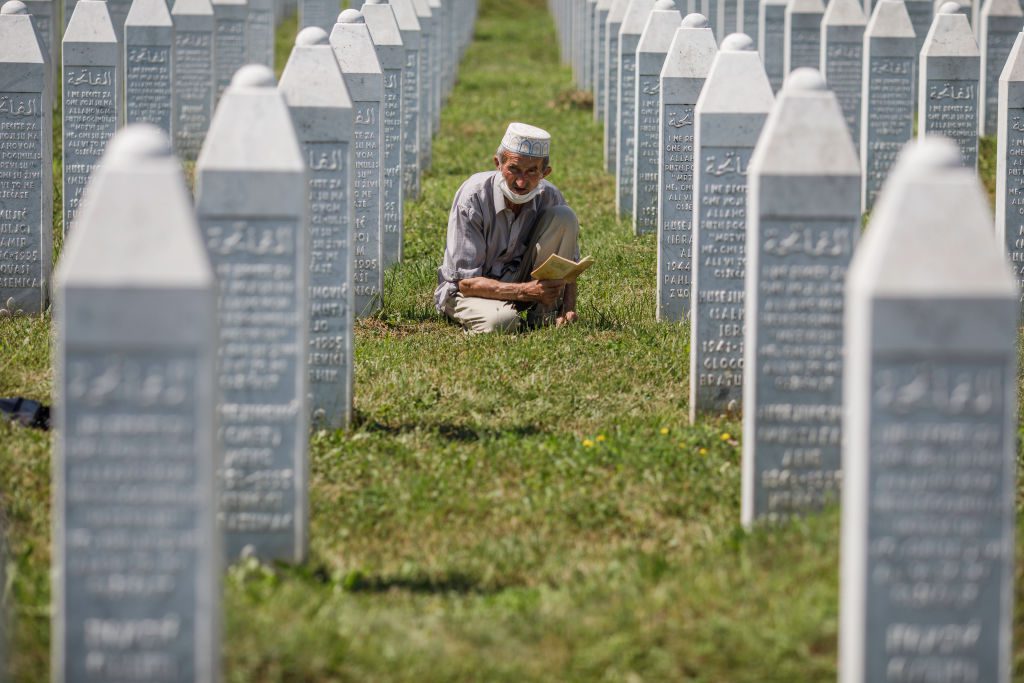The Shadow of Srebrenica, 25 Years Later

Twenty-five years ago this July, one of the worst crimes on European soil since World War II took place in the Bosnian village of Srebrenica. Ethnic Serbian militias from the breakaway Republic of Srpska massacred over 8,000 unarmed Muslim Bosniaks while UN peacekeepers helplessly stood by. The killings, combined with the indiscriminate shelling of a Sarajevo marketplace in the weeks that followed, provoked a NATO air campaign that eventually imposed an uneasy peace settlement in Bosnia. Yet other than a few pious remarks from Western leaders, this somber anniversary has been mostly ignored, even though the uneasy legacy of Srebrenica continues to shape American and European foreign policy.
At least in Western circles, the Bosnian intervention was supposed to be the template for a post-Cold War approach that emphasized humanitarian concerns over realpolitik. The American-led air campaign and the resulting Dayton Accords succeeded in establishing a tripartite system in Bosnia, enforced by NATO and later EU peacekeepers, in which the Croat, Bosniak, and Serb sections of the country were granted considerable autonomy.
The Bosnian intervention shaped a generation of American policymakers. Samantha Power, UN ambassador under Barack Obama and possible secretary of state in a future Biden administration, was deeply impacted by her experiences reporting in the Balkans. The success of NATO’s Bosnia campaign led her to write a book that made her reputation, A Problem from Hell. From there came the eventual formulation of a “responsibility to protect” doctrine of humanitarian intervention.
The attraction of the Bosnian model is easy to understand. Effecting a ceasefire required a brief NATO air campaign against an overmatched foe. Western ground troops were only deployed in a peacekeeping role after the Dayton Accords were signed. The NATO operation was even endorsed by the UN. A short, almost cost-free campaign from the air, sanctioned by the international community and successful at bringing the combatants to the negotiating table, seemed to inaugurate a newer, more hopeful era in global politics.
Since then, Western countries have been trying to recreate the Bosnian model with varying degrees of success. The 1999 NATO air campaign against Serbia, aimed at preventing the ethnic cleansing of Muslim Albanians in the Serbian province of Kosovo, came closest to the original blueprint. Even then, the costs and limits of humanitarian air strikes had become apparent. Serbia was a tougher nut to crack than its proxy militias in Bosnia, enduring a longer than anticipated air campaign while bringing down an American stealth bomber in the process.
Meanwhile, the tenuous international consensus around humanitarian intervention had already broken down. Even at the nadir of its economic and military strength, the Russian government vociferously objected to the Kosovo campaign, a response that anticipated its more assertive foreign policy under Vladimir Putin. (In an ironic twist, the Russians have opportunistically borrowed the language of Western humanitarianism to justify intervening in their own near abroad.) China, already skeptical of interfering in other countries’ internal affairs, was further antagonized by the accidental NATO bombing of its Belgrade embassy, a harbinger of future clashes in an increasingly contentious Sino-American relationship.
Western policymakers keep chasing the tantalizing prospect of cost-free humanitarian interventions, but subsequent campaigns have been even less successful than Kosovo. The 2011 NATO intervention in Libya, conducted almost entirely from the air, left the country in disarray and destabilized the entire region. Airstrikes in Syria helped destroy the Islamic State, but were rather less effective at deposing or even deterring the murderous Bashar al-Assad and protecting Syria’s brutalized people.
Instead of a blueprint for future policy, the Bosnian campaign should be recognized for what it was: a limited operation made possible by a unique confluence of favorable circumstances. For one, considerable ethnic cleansing had already taken place within Bosnia by the time NATO got involved, leaving fewer potential flash points for a renewed outbreak of sectarian violence. The Serbian militias in Bosnia were also particularly vulnerable to Western airpower. They had no powerful foreign sponsors (Russian objections were muted and the Serbian government quickly withdrew its support), the theater of conflict was in Europe’s backyard, and Western military supremacy had reached its post-Cold War apex.
Now Western policymakers must grapple with a more complicated world. Airstrikes often aren’t enough to prevent atrocities and there is little public appetite for deploying combat troops for humanitarian missions. Meanwhile, as the military gap between the West and the rest of the world narrows, the international consensus around humanitarian intervention has also evaporated. As Samuel Huntington noted in The Clash of Civilizations, Western ideas about the international system, including the recent enthusiasm for humanitarian operations, have always been underwritten by overwhelming military force: “The West won the world not by the superiority of its ideas or values or religion but rather by its superiority in applying organized violence. Westerners often forget this fact; non-Westerners never do.” As its military edge erodes, so too will the West’s ability to forge international coalitions.
Marking the anniversary of the Srebrenica massacre, EU Foreign Affairs Minister Josep Borrel declared that Europe must “make sure that it never happens again.” The sad truth is that, from Syria to Myanmar to China’s western provinces, ethnic cleansing occurs with numbing regularity. It is a successful, cost-free humanitarian intervention that will likely never happen again. For the last 25 years, Western countries have fitfully attempted to make the Bosnian campaign a blueprint for a rules-based international order. It’s time to admit that Bosnia was not a template but an outlier.
Will Collins is an English teacher who lives and works in Eger, Hungary.
Comments